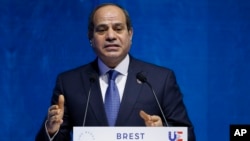Egyptian President Abdel Fattah el-Sissi warned Saturday of a "vicious cycle" of violence after Hamas launched a deadly attack on Israel, which responded with devastating airstrikes on Gaza.
El-Sissi received a call from French President Emmanuel Macron, Egypt's presidency said, and the two discussed "coordinating efforts to stop the escalation in the Gaza Strip between the Palestinian and Israeli sides."
Cairo has historically been a key mediator in conflicts between Israel and the Palestinians.
El-Sissi's spokesperson said he "warned against the danger of the situation deteriorating and sliding into more violence, the worsening of humanitarian conditions in Gaza and the region entering into a vicious cycle of tensions that threatens regional stability and security."
The foreign ministry had earlier appealed to "both the Palestinian and Israeli sides to exercise the highest degrees of restraint."
Foreign Minister Sameh Shoukry made a series of calls, including to his counterparts in the United States, Russia, Turkey, Germany, France and Spain, to rally "international actors" to "intervene immediately."
He received a call from U.S. Secretary of State Antony Blinken, the foreign ministry said, to discuss "the international and regional efforts that must be undertaken to contain the situation and put an end to the violence and the loss of life."
Shoukry and Russia's Sergei Lavrov stressed "the need for an immediate stop to the escalations" ahead of an emergency U.N. Security Council meeting Sunday, a foreign ministry statement said.
Shoukry called on the Security Council to "uphold its responsibility" and "put measures in place to protect Palestinian rights."
Months of violence
In a call with Jordan's Foreign Minister Ayman Safadi, both men "expressed their deep concern about the progressive and dangerous deterioration of events."
Separately, Safadi warned of the "volatility" of the situation, "particularly in light of what cities and areas of the West Bank are witnessing of Israeli attacks and violations against the Palestinian people."
The Hamas assault follows months of surging violence in the Israeli-Palestinian conflict, with fatalities in the occupied West Bank hitting a scale not seen in years.
Jordan and Egypt were the first two regional states to forge peace deals with Israel, before U.S.-backed diplomatic normalizations followed in 2020 with the United Arab Emirates, Bahrain and Morocco.
Shoukry also called UAE Foreign Minister Sheikh Abdullah Bin Zayed to discuss "the gravity of the current situation and the need to make every effort to prevent the security situation from getting out of control."
The Hamas attack sparked a wave of condemnation, with European Union chief Ursula von der Leyen calling it "terrorism in its most despicable form."
In a call with EU foreign policy chief Josep Borrell, Shoukry stressed the "importance of stopping the escalation and all sides exercising restraint."
Cairo also called on the international community to "urge Israel to stop the attacks and provocative actions against the Palestinian people and to adhere to the principles of international humanitarian law with regard to the responsibilities of an occupying state."




